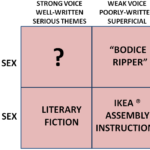
 Ah finally! After the weak and weirdly constructed assaults on literature by Lee Siegel and Philip Roth, finally I read a critique of modern publishing I can pass on as insightful rather than insipid.
Ah finally! After the weak and weirdly constructed assaults on literature by Lee Siegel and Philip Roth, finally I read a critique of modern publishing I can pass on as insightful rather than insipid.
Anis Shivani skewers the MFA system*, a major player in the “writer as consumer” model that’s turning publishing into a pyramid scheme. But, Shivani’s beef isn’t with the upturning of the business model of publishing, but with the institutional dynamics that select for mediocrity:
The ascent of creative writing programs means that few with critical ability have any incentive to rock the boat–awards and jobs may be held back in retaliation. The writing programs embody a philosophy of neutered multiculturalism/political correctness; as long as writers play by the rules (no threatening history or politics), there’s no incentive to call them out. (A politically fecund multiculturalism–very desirable in this time of xenophobia–is the farthest thing from the minds of the official arbiters: such writing would be deemed “dangerous,” and never have a chance against the mediocrities.)
The MFA writing system, with its mechanisms of circulating popularity and fashionableness, leans heavily on the easily imitable. Cloying writers like Denis Johnson, Amy Hempel, Lydia Davis, Aimee Bender, and Charles D’Ambrosio are held up as models of good writing, because they’re easy enough to copy. And copied they are, in tens of thousands of stories manufactured in workshops.
The rest of the critique, including Shivani’s list of the Top 15 Most Overrated American Writers, is equally scathing, and equally valuable for anyone who wants to understand how the publishing biz is eating itself alive.
_
* I was well on my way to the MFA track when I transferred from WVSU to UVA, which would not accept my writing transfers as major credit, forcing me to choose a new major. This happenstance may have scuttled, or hindered, my chances of being published, but in retrospect I am glad to have had years of outward-looking experience in the military and intelligence communities rather than years in a literary Hall of Mirrors.

 On Friday, Slate.com published a fantastic piece by Chad Harbach titled “MFA v. NYC : America now has two distinct literary cultures. Which one will last?”
On Friday, Slate.com published a fantastic piece by Chad Harbach titled “MFA v. NYC : America now has two distinct literary cultures. Which one will last?”




 Today I want to perform a philosophical genealogy, tracing today’s deluge of aspiring authors to the political and theological underpinnings of the Modern age.
Today I want to perform a philosophical genealogy, tracing today’s deluge of aspiring authors to the political and theological underpinnings of the Modern age.
 I first became aware of the slippage of the idea of a mash-up when I found songs on the iTunes store identified as “mash-ups” which were in fact merely remakes or sample-derived songs.
I first became aware of the slippage of the idea of a mash-up when I found songs on the iTunes store identified as “mash-ups” which were in fact merely remakes or sample-derived songs.